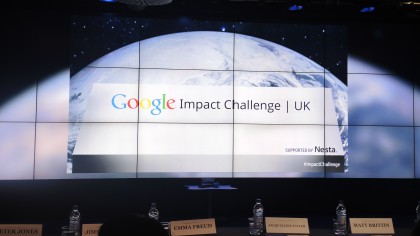Google just backed some new smart glasses - and these ones will actually change lives
G's up to its philanthropic tricks again
You may have heard the rumour going around: Google's got a little bit of money these days. So as part of its second Global Impact Challenge initiative, it's just awarded a bunch of UK-based tech projects a tonne of cash to go out and change the world.
Ten groups were selected for the final stage of the challenge, which took place today. Four of the final ten (announced by Sir Richard Branson's massive head which dialled in for a video call) were awarded £500,000 (around $845,000/AU$908,000) while the runners-up all walked away with a still-respectable £200,000 (around $338,000/AU363,000) each. Nothing to sniff at.
And there were some pretty neat ideas in the mix, with wearable tech clearly making its stamp this year. One of the day's winners (which actually bagged the People's Choice award, not one of the judges' accolades) was a project to develop smart glasses, proposed by the RNIB.
While Google Glass is still trying to discover ways of being helpful in our lives, the RNIB's smart glasses have instantly life-changing applications.The wearable device will allow people with sight loss to "see" the world around them. Bringing glass to Google was a pretty smart move, we have to say.
"90% of people who are registered blind have some degree of remaining vision," Neil Heslop, MD of RNIB Solutions told TechRadar. "The depth camera assess the shape, size and position of nearby objects and then they present on a pair of transparent displays both a view of the normal world but also with an overlay with enhancements of those nearby objects… Nearby objects are brighter. Darker objects are obviously dimmer. And there's an outline as well. There's edge enhancement."
Wikipedia founder Jimmy Wales, one of the Challenge judges, later told TechRadar that the smart glasses were his choice of the show: "They're in the right area. The tech is almost there, and work in that area is going to be very fruitful." The question is: can the RNIB beat Microsoft, which is rumoured to be working on a wearable to also aid the blind?
Gaming: it's good for you

Another intriguing idea - and winner - was the Royal Botanic Gardens Kew's wearable device that can hear mosquitoes. The small gizmo can be attached to a wristband and aims to detect different types of mosquito so as to help prevent certain diseases. Apparently every species of mosquito has its own unique wing beat. Who knew?
Sign up for breaking news, reviews, opinion, top tech deals, and more.
One that didn't quite manage to bag the £500k, but did catch our attention, was an idea formed from Android game technology and wearables to help improve the mental health of young people. Created by We Are What We Do, the project is a game, which works by helping people strengthen their emotional resilience and manage stress.
"The aim is to create a game that is really playable, but with this extra component that makes it more interesting," company CEO (and TEDx speaker) Nick Stanhope told TechRadar. "So plugged into FIFA, for example, to take a winning penalty you have to stay cool under pressure… it's something that will be built into games. So we're building a concept that can show the benefits of mental health for everybody. And shows the games industry this is a really interesting mechanic that can be built into games."
The aim is to get the project in the hands of people in three years time. "Once they've learned that behaviour, it's very difficult to unlearn in."
The two other winners picked by the judges were Centrepoint - a data analytics project to help resolve homelessness among young people - and WeFarm, a P2P communication service for farmers to improve their livelihoods.
Of course, the other six hardly walked away empty handed. And as Jimmy Wales said "What better way to spend an afternoon than giving away massive amounts of Google's money?"

Hugh Langley is the ex-News Editor of TechRadar. He had written for many magazines and websites including Business Insider, The Telegraph, IGN, Gizmodo, Entrepreneur Magazine, WIRED (UK), TrustedReviews, Business Insider Australia, Business Insider India, Business Insider Singapore, Wareable, The Ambient and more.
Hugh is now a correspondent at Business Insider covering Google and Alphabet, and has the unfortunate distinction of accidentally linking the TechRadar homepage to a rival publication.